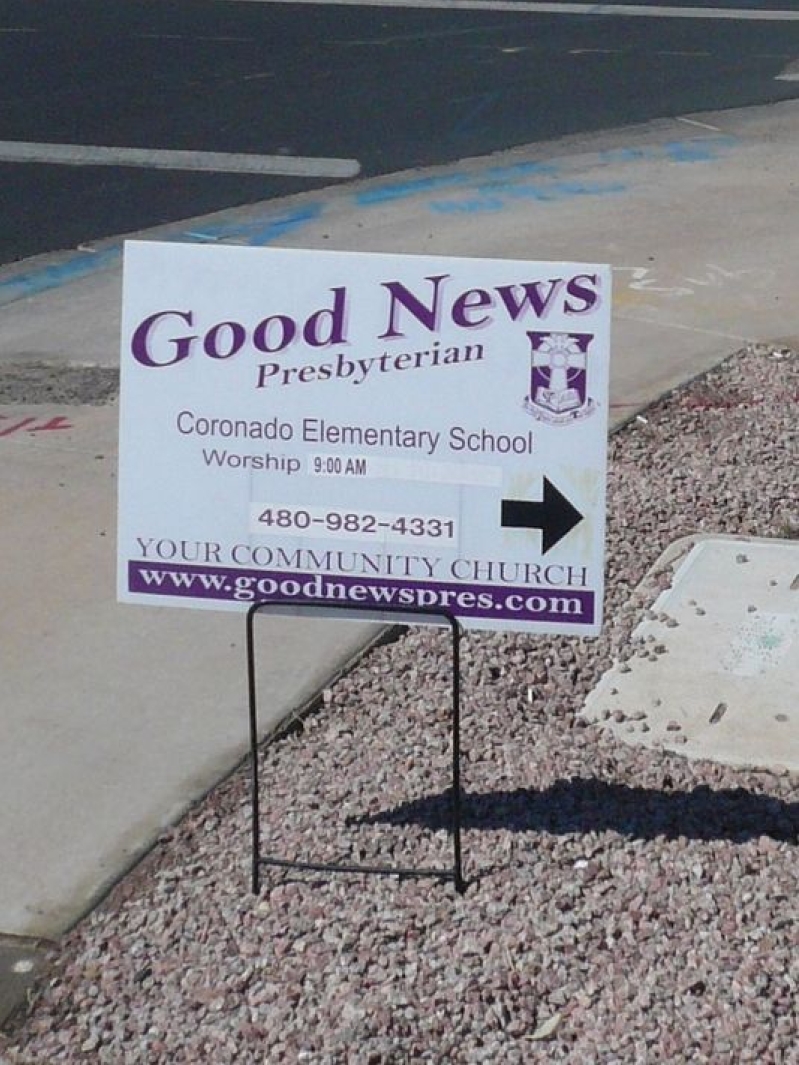
The Supreme Court took up a case in its current session and focused on oral arguments on Monday that involved a small church in a Phoenix suburb and a local ordinance. Based on the judges' reaction, it seemed the ruling may be in favor of the church.
According to an article written by the Associated Press, Pastor Clyde Reed, along with the Good News Community Church, sued the city of Gilbert, Ariz. over the town's local ordinance that placed limits on roadside signs that direct people to Sunday services. Judge Samuel Alito, a conservative, took a sarcastic tone in describing how the church could erect a larger, temporary sign.
"We can't tell you where it is because the town won't let us," Alito said, to laughter. "But if you drive by here tomorrow morning at a certain time, you'll see an arrow."
The Associated Press described the ordinance in question.
"The directional signs can be no larger than 6 square feet," the Associated Press wrote. "They must be placed in public areas no more than 12 hours before an event and removed within an hour of its end. Signs for political candidates, by contrast, can be up to 32 square feet and can remain in place for several months."
The Associated Press added that "other ideological signs" can be as large as 20 square feet. The church's sign advertising its services to people without directions would fall under that section of the ordinance.
According to Jonathan Reid of The Arizona Republic, Reed argued that Gilbert's sign code was discriminatory "because it stipulates the size and number of signs he can post to advertise his religious services," while political signs had more flexible rules. The pastor also commented that the code placed limits on how long a non-commercial event sign can be posted before an event.
However, The Arizona Republic reported that attorneys representing the city of Gilbert argued that the pastor's First Amendment rights were not violated, given that the code focuses on standards for all non-commercial event signs and not the actual content itself.
Kevin Martin, an attorney who has briefed cases before the Supreme Court, told The Arizona Republic that the high court's decision could affect how courts determine First Amendment rights in the future.
"The outcome of this case, and the question 'What level of scrutiny do you apply to laws that on their face discriminate (against) different kinds of speech?' has ramifications well beyond Gilbert and well beyond simply sign regulations," Martin said. "You can think of dozens of examples where governments say this type of content cannot be uttered in this part of town or in a certain way. (Those laws) will survive or not depending on what level of scrutiny gets applied."
Justice Steven Breyer, a liberal, asked the town's lawyer, Philip Savrin, about the absurdity of the ordinance.
"Well, my goodness. I mean...it does sound as if the town is being a little unreasonable, doesn't it?" Breyer asked.
Savrin argued that ruling in the pastor's favor could actually limit freedom of speech, according to The Arizona Republic.
"In order to pass strict scrutiny, the legislatures in these towns and cities across this country would be inclined to ban all signs except those that the First Amendment absolutely allows," Savrin said.
Justice Antonin Scalia, a conservative, attacked Savrin's view that ideological signs and directional signs have different levels of protection and scrutiny.
"I mean, ideological signs, that is just a content category, and there is as much a First Amendment right to give somebody directions as there is to speak about - about being green or whatever else," Scalia said. "Is there no First Amendment right to give somebody directions?"
Lawrence Hurley of Reuters reported that despite the nearly even split among conservatives and liberals within the Supreme Court, justices from both sides appeared to voice support for the church. Justice Elena Kagan, a liberal, seemed to summarize the view from the bench.
"You are essentially saying, 'Yes, we generally dislike clutter, but we're willing to make exceptions for clutter for speech that we think has special First Amendment significance,'" Kagan said.
According to the Associated Press, lower federal courts, including the 9th U.S. Circuit Court of Appeals, have upheld the town's sign ordinance because "the distinction it draws between different kinds of temporary signs is not based on what a sign says."
Although the case could be seen as an important First Amendment ruling on the regulation of speech, Reuters noted that the high court could allow local governments some leeway to regulate signs.
"Under court precedent, local governments can regulate signs for either safety or aesthetic reasons," Hurley wrote. "But the justices signaled the town had made a mistake by setting up different categories based in part on the content of the message being conveyed."
After the oral arguments were made, The Arizona Republic noted that Reed gave a prepared speech outside the Supreme Court.
"This whole experience has been shocking to me - our signs inviting people to church are very important yet are treated as second-class speech," Reed said. "We aren't asking for special treatment; we just want our town to stop favoring the speech of others over ours."
The Supreme Court is expected to make its final decision regarding Reed v. Gilbert, No. 13-502, in June.







